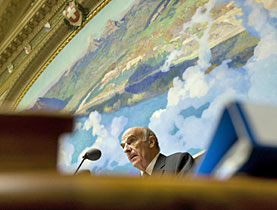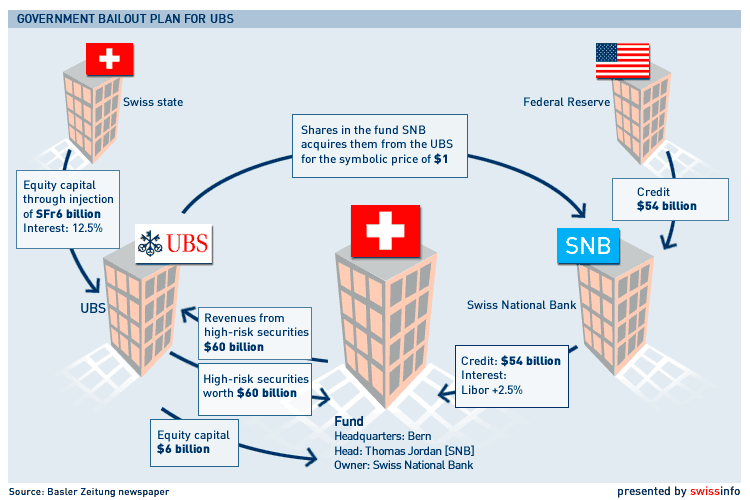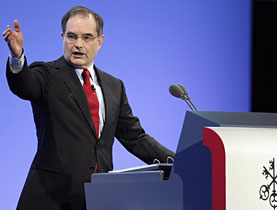Bailout plan agreed despite leftwing protest

Parliament has approved the government's multi-billion bailout package for leading bank UBS and increased account holders' protection.
The centre-left failed to convince the House of Representatives and the Senate to apply additional conditions to the $60 billion (SFr73 billion) funding, including caps on manager salaries.
The financial rescue plan, including a $54 billion government loan and a SFr6 billion cash injection for UBS, was only contested by the Greens.
The four main political parties agreed that the package was necessary given the importance of UBS for the country’s economy, but many speakers criticised the government for acting before parliament met.
They said parliament in reality had no other choice but to rubberstamp the emergency plan.
“Taxpayers will have to shoulder immense risks,” warned Social Democrat Hans-Jürg Fehr during a seven-hour debate in the House of Representatives on Monday.
But Fulvio Pelli, senior parliamentarian of the centre-right Radical Party, argued the financial package was balanced and the government, the National Bank and the federal banking regulator had acted wisely.
“There is no reason to doubt their decision. Discussions about alternative models are driven by party politics and are just for the galleries,” he said.
All 11 proposals to link the SFr6 billion cash injection to further measures were rejected by the House, although with a wafer-thin majority in one case.
Senate
Tuesday’s five-hour debate in the Senate focused again on the government’s policy and the failures of the banking industry to prevent a financial crisis.
Senators also called for reforms of emergency procedures and tighter regulations for financial institutions.
Finance Minister Hans-Rudolf Merz defended the government strategy. “The cabinet and the National Bank agreed that it was only possible to act without consulting parliament because of the UBS exposure on the stock markets.”
However Merz acknowledged an examination of emergency procedures was needed to honour parliament’s supremacy and democratic principles.
He added that UBS had agreed to improve corporate governance rules, while the banking regulator would step up controls of the sector.
Refunding bonuses
The Senate narrowly agreed to a proposal by the centre-left compelling managers to refund excessive payments.
The House, which threw out the proposal on Monday, will discuss the issue again in the next few days of the regular winter session.
In a related development both parliamentary chambers overwhelmingly agreed a government proposal to more than triple account holder protection to SFr100,000 from the current SFr30,000.
Several newspaper criticised Monday’s debate. The Bern-based Der Bund highlighted the fact that parliament had no real choice but to agree the bailout.
In a slightly sarcastic tone, the Tages-Anzeiger editorial was titled Pay and Obey, while the main French-language Le Temps paper described the bailout plan as a bitter pill.
For its part, the respected Neue Zürcher Zeitung, which is close to the business community, welcomed the outcome of the debate as reasonable.
swissinfo, Urs Geiser
Votes on bailout package:
House of Representatives 116 yes, 55 no.
Senate 22 yes, 2 no.
UBS was hardest hit by the US subprime-mortgage crisis. It wrote down about $44 billion and announced 1,500 job losses.
The Credit Suisse (CS) says it will axe 5,300 jobs worldwide, including 650 in Switzerland.
UBS is to benefit from a bailout plan to the tune of more than SFr60 million, while CS said it would not participate in the programme.
Last week Finance Minister Hans-Rudolf Merz said he saw no need for CS to join the bailout plan.
A $700 billion-rescue package by the US government was originally aimed at purchasing bad assets to reduce uncertainty regarding the worth of the remaining assets.
It was later updated to purchase distressed assets, especially mortgage-backed securities, and make capital injections.
The £50-billion plan by the British prime minister, Gordon Brown, combines injections of liquidity into the market and guarantees to encourage banks to start lending to each other again.
Many European Union countries followed the lead of the British government.
The Swiss government’s rescue package includes a $54 billion loan to the leading bank and a SFr6 billion injection of cash to bolster the bank’s capital basis.


In compliance with the JTI standards
More: SWI swissinfo.ch certified by the Journalism Trust Initiative




You can find an overview of ongoing debates with our journalists here. Please join us!
If you want to start a conversation about a topic raised in this article or want to report factual errors, email us at english@swissinfo.ch.